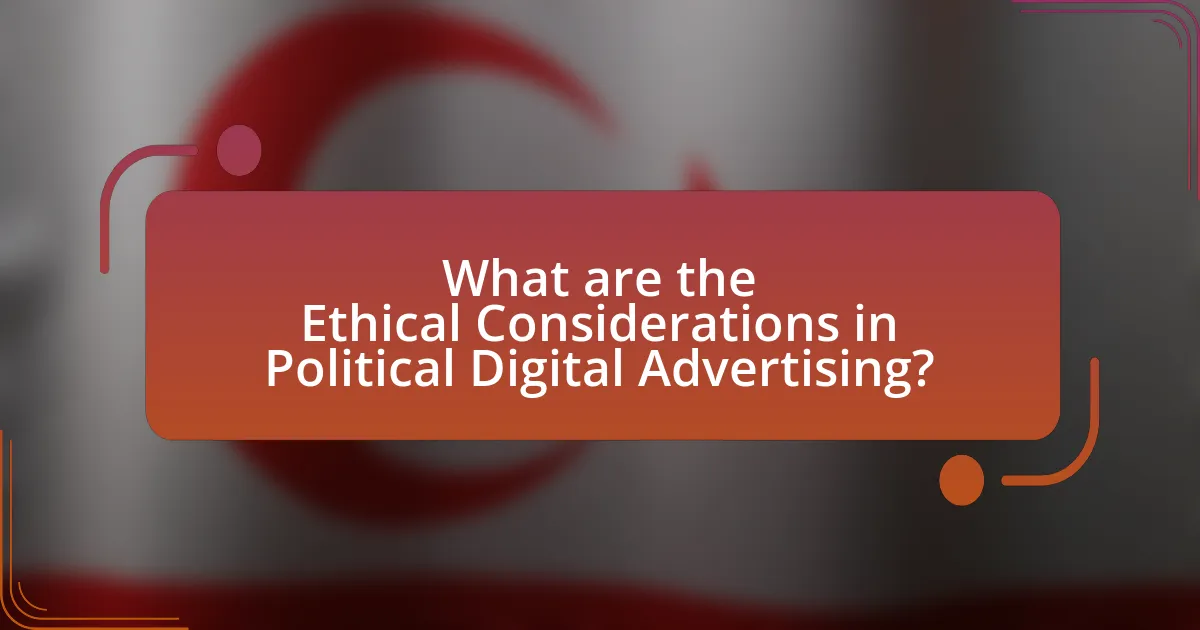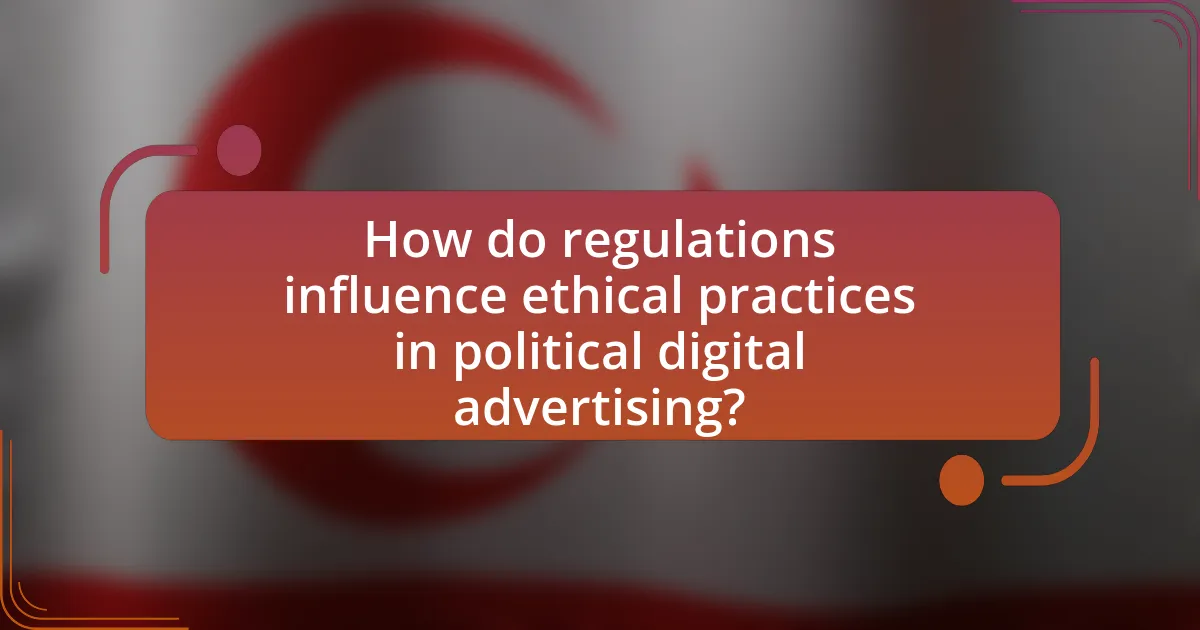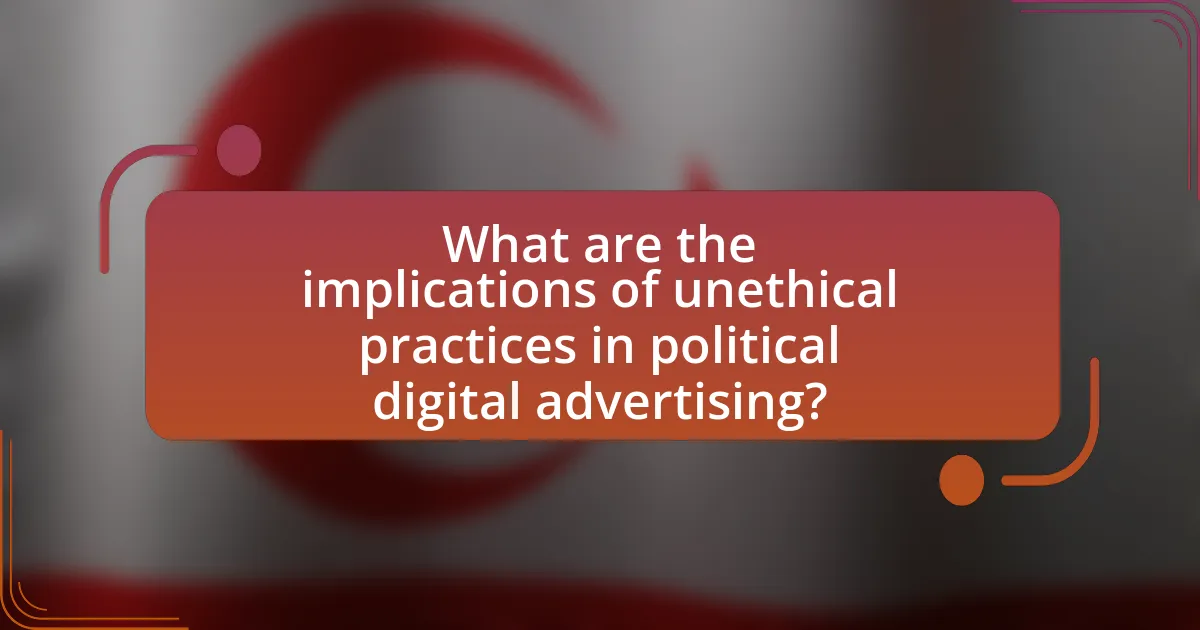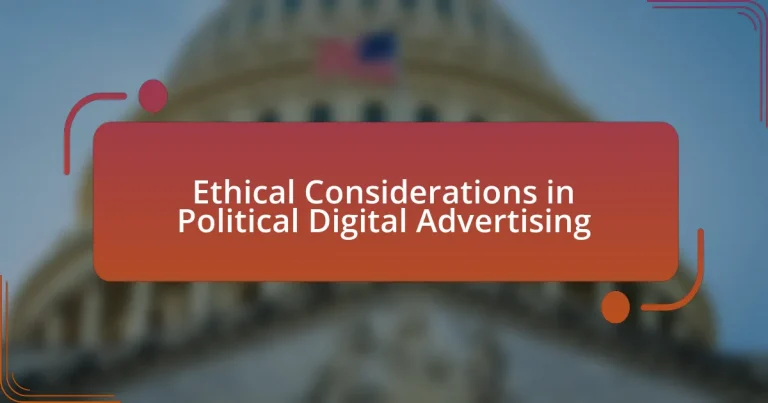The article focuses on ethical considerations in political digital advertising, highlighting key issues such as transparency, misinformation, data privacy, and manipulation. It emphasizes the importance of ethical practices in maintaining public trust and accountability in political messaging, while also addressing the ethical dilemmas that arise from misinformation and privacy violations. The article outlines the principles of ethical advertising, the impact of regulations, and the consequences of unethical practices, ultimately underscoring the need for campaigns to adopt best practices that promote transparency and truthfulness in their advertising efforts.

What are the Ethical Considerations in Political Digital Advertising?
Ethical considerations in political digital advertising include transparency, misinformation, data privacy, and manipulation. Transparency requires that political ads disclose their funding sources and affiliations, ensuring voters understand who is behind the message. Misinformation poses a significant risk, as false claims can spread rapidly online, influencing public opinion and electoral outcomes. Data privacy concerns arise from the collection and use of personal data to target voters, raising questions about consent and the ethical use of such information. Manipulation tactics, such as emotional appeals or fear-based messaging, can undermine democratic processes by swaying voters based on emotional responses rather than informed decision-making. These considerations are critical for maintaining the integrity of political discourse and protecting democratic values.
Why is ethics important in political digital advertising?
Ethics is crucial in political digital advertising because it ensures transparency, accountability, and fairness in the communication of political messages. Ethical practices help prevent misinformation and manipulation, which can undermine democratic processes. For instance, the Cambridge Analytica scandal highlighted how unethical data practices can exploit personal information to influence voter behavior, leading to calls for stricter regulations in digital advertising. By adhering to ethical standards, political advertisers can foster trust with the electorate, ultimately contributing to a healthier democratic environment.
What ethical dilemmas arise in political digital advertising?
Ethical dilemmas in political digital advertising include misinformation, manipulation of voter behavior, and privacy violations. Misinformation can mislead voters about candidates or policies, undermining democratic processes; for example, false claims about a candidate’s record can spread rapidly through targeted ads. Manipulation of voter behavior occurs when advertisers exploit psychological tactics to influence decisions, raising concerns about autonomy and informed choice. Privacy violations arise when personal data is used without consent to target individuals, as seen in cases where data from social media platforms is harvested for political campaigns. These dilemmas challenge the integrity of political discourse and the ethical responsibilities of advertisers.
How do ethical considerations impact voter perception?
Ethical considerations significantly impact voter perception by shaping trust and credibility in political messaging. When candidates adhere to ethical standards, such as transparency and honesty, voters are more likely to perceive them positively, leading to increased support. For instance, a study by the Pew Research Center found that 70% of voters consider a candidate’s integrity crucial when making electoral decisions. Conversely, unethical practices, such as misinformation or manipulation, can lead to skepticism and distrust, ultimately diminishing voter engagement and support.
What are the key principles of ethical political advertising?
The key principles of ethical political advertising include honesty, transparency, respect for privacy, and accountability. Honesty requires that advertisements present truthful information about candidates and their positions, avoiding misleading claims. Transparency involves clearly disclosing the sources of funding for advertisements, allowing voters to understand potential biases. Respect for privacy ensures that personal data used in targeting ads is obtained and utilized ethically, without infringing on individuals’ rights. Accountability mandates that advertisers take responsibility for the content they produce, including correcting misinformation and addressing any negative consequences of their ads. These principles are essential for maintaining public trust and fostering a fair democratic process.
How does transparency play a role in ethical advertising?
Transparency is essential in ethical advertising as it fosters trust between advertisers and consumers. When advertisers disclose information about their products, including sourcing, pricing, and potential biases, consumers can make informed decisions. Research indicates that 94% of consumers are likely to be loyal to a brand that offers complete transparency (Label Insight, 2016). This trust not only enhances brand reputation but also aligns with ethical standards, ensuring that advertising practices are honest and accountable. Thus, transparency directly contributes to the integrity of advertising in the political digital landscape.
What is the significance of truthfulness in political messaging?
Truthfulness in political messaging is crucial for maintaining public trust and ensuring informed decision-making among voters. When political messages are truthful, they foster transparency and accountability, which are essential for a healthy democratic process. Research indicates that misinformation can lead to voter apathy and cynicism, undermining electoral participation. For instance, a study by the Pew Research Center found that 64% of Americans believe fabricated news stories cause confusion about basic facts, highlighting the detrimental effects of untruthful messaging on public perception and engagement. Thus, truthfulness serves as a foundation for ethical political communication, reinforcing the integrity of democratic institutions.

How do regulations influence ethical practices in political digital advertising?
Regulations significantly influence ethical practices in political digital advertising by establishing standards that govern transparency, accountability, and truthfulness in messaging. For instance, laws such as the Federal Election Commission regulations in the United States require political advertisers to disclose the sources of their funding and the identities of sponsors, which promotes transparency and helps prevent misleading information. Additionally, the General Data Protection Regulation (GDPR) in Europe mandates that advertisers obtain consent for data collection, thereby ensuring that personal data is handled ethically. These regulatory frameworks compel political advertisers to adhere to ethical standards, thereby fostering trust and integrity in the political advertising landscape.
What laws govern political digital advertising?
Laws governing political digital advertising include the Federal Election Commission (FEC) regulations in the United States, which require transparency in political ad funding and disclosure of sponsors. These regulations mandate that political advertisements disclose who paid for them and adhere to contribution limits set for campaign financing. Additionally, the Communications Act and various state laws impose requirements on digital platforms to maintain records of political ads and their sponsors. The implementation of the Honest Ads Act has further aimed to enhance transparency in online political advertising by extending existing disclosure requirements to digital platforms. These laws are designed to ensure accountability and prevent misinformation in political campaigns.
How do these laws promote ethical standards?
Laws promoting ethical standards in political digital advertising ensure transparency, accountability, and fairness in the dissemination of information. By mandating disclosure of funding sources and the origins of advertisements, these laws help prevent misinformation and manipulation of public opinion. For instance, the Federal Election Commission requires political ads to clearly state who paid for them, which fosters trust and allows voters to make informed decisions. Additionally, regulations against false claims and deceptive practices uphold integrity in political discourse, reinforcing the ethical obligation of advertisers to present truthful information.
What are the consequences of violating advertising regulations?
Violating advertising regulations can lead to significant legal and financial consequences for businesses and individuals. Regulatory bodies, such as the Federal Trade Commission (FTC) in the United States, can impose fines, require corrective advertising, and even initiate legal action against violators. For instance, in 2020, the FTC issued over $1.5 billion in penalties for deceptive advertising practices, highlighting the serious repercussions of non-compliance. Additionally, companies may suffer reputational damage, loss of consumer trust, and potential bans from advertising platforms, further impacting their market position.
How do different countries approach ethical standards in political advertising?
Different countries approach ethical standards in political advertising through varying regulations and guidelines that reflect their cultural, legal, and political contexts. For instance, the United States relies on self-regulation by industry groups, such as the American Advertising Federation, which emphasizes truthfulness and transparency, but lacks comprehensive federal laws governing political advertising. In contrast, countries like Canada enforce strict regulations through the Canada Elections Act, which mandates disclosure of funding sources and limits on advertising spending during election periods. Additionally, the United Kingdom has established the Advertising Standards Authority, which oversees compliance with ethical advertising standards, including political ads, ensuring they are not misleading. These diverse approaches highlight how ethical standards in political advertising are shaped by national values and legal frameworks.
What are the variations in ethical guidelines across countries?
Variations in ethical guidelines across countries significantly impact political digital advertising practices. For instance, the United States emphasizes freedom of speech, leading to less stringent regulations on political advertising compared to countries like Germany, which enforces strict laws against hate speech and misinformation. In the European Union, the General Data Protection Regulation (GDPR) mandates transparency in data usage, affecting how political ads are targeted and presented. Additionally, countries such as Australia have specific codes of conduct for political advertising that require disclosures about funding sources. These differences illustrate how cultural, legal, and political contexts shape ethical standards in political digital advertising globally.
How do cultural differences affect ethical advertising practices?
Cultural differences significantly affect ethical advertising practices by influencing perceptions of appropriateness, values, and messaging strategies. For instance, in collectivist cultures, advertisements that emphasize community and family may resonate more positively, while individualistic cultures may respond better to messages highlighting personal achievement and independence. Research by Hofstede indicates that cultural dimensions, such as individualism versus collectivism, directly impact consumer behavior and ethical standards in advertising. This suggests that advertisers must tailor their approaches to align with cultural norms to maintain ethical integrity and effectiveness in their campaigns.

What are the implications of unethical practices in political digital advertising?
Unethical practices in political digital advertising can lead to significant erosion of public trust in democratic processes. When campaigns engage in misinformation, manipulation, or exploitation of personal data, they undermine the integrity of electoral systems. For instance, the Cambridge Analytica scandal revealed how data misuse can influence voter behavior, resulting in a loss of confidence in the electoral process. Additionally, unethical advertising can polarize public opinion, creating divisions that hinder constructive political discourse. Research indicates that exposure to misleading political ads can increase voter apathy and disengagement, further destabilizing democratic participation.
What are the potential consequences of misinformation in political ads?
Misinformation in political ads can lead to significant consequences, including the erosion of public trust in democratic institutions. When voters are exposed to false information, it can distort their perceptions of candidates and issues, ultimately influencing electoral outcomes. A study by the Pew Research Center found that 64% of Americans believe that misinformation has a major impact on their ability to make informed decisions during elections. Additionally, misinformation can polarize public opinion, creating divisions among the electorate and undermining social cohesion. This phenomenon has been observed in various elections, where misleading ads have contributed to increased political polarization and hostility among different groups.
How does misinformation affect democratic processes?
Misinformation undermines democratic processes by distorting public perception and influencing voter behavior. It can lead to the spread of false narratives that misguide citizens about candidates, policies, and electoral procedures, ultimately eroding trust in democratic institutions. For instance, a study by the Pew Research Center found that 64% of Americans believe fabricated news stories cause confusion about the basic facts of current events, which can skew electoral outcomes. Furthermore, misinformation campaigns, often amplified through social media, can create polarization and hinder constructive political discourse, as evidenced by the 2016 U.S. presidential election, where false information significantly impacted voter opinions and decisions.
What role does social media play in spreading misinformation?
Social media plays a significant role in spreading misinformation by facilitating rapid dissemination of false information to a wide audience. Platforms like Facebook and Twitter enable users to share content instantly, often without verification, leading to the viral spread of misleading narratives. A study by the Massachusetts Institute of Technology found that false news stories are 70% more likely to be retweeted than true stories, highlighting the platform’s impact on information propagation. Additionally, algorithms prioritize engagement over accuracy, further amplifying sensational or misleading content.
How can political campaigns ensure ethical digital advertising practices?
Political campaigns can ensure ethical digital advertising practices by adhering to transparency, accuracy, and data privacy standards. Transparency involves clearly disclosing the sources of funding for advertisements and the targeting criteria used, which helps voters understand the motivations behind the messaging. Accuracy requires that all claims made in advertisements are fact-checked and substantiated, preventing the spread of misinformation. Data privacy standards mandate that campaigns respect user consent and data protection regulations, such as the General Data Protection Regulation (GDPR) in Europe, which emphasizes the importance of obtaining explicit consent before collecting or using personal data for targeted advertising. By implementing these practices, campaigns can foster trust and integrity in their digital advertising efforts.
What strategies can campaigns implement to promote transparency?
Campaigns can implement strategies such as disclosing funding sources, providing clear information about ad targeting, and offering accessible data on campaign expenditures to promote transparency. Disclosing funding sources allows voters to understand who supports the campaign, which can influence public perception and trust. Clear information about ad targeting helps voters see how and why they are being targeted, fostering accountability. Additionally, making data on campaign expenditures publicly accessible enables scrutiny of financial practices, reinforcing ethical standards in political advertising. These strategies collectively enhance transparency and build trust with the electorate.
How can campaigns effectively fact-check their advertisements?
Campaigns can effectively fact-check their advertisements by implementing a systematic review process that includes verifying claims against credible sources. This involves cross-referencing statements made in advertisements with established facts from reputable organizations, such as fact-checking websites like PolitiFact or Snopes, and utilizing data from government reports or academic studies. For instance, a campaign can validate a statistic by checking it against the original source or a peer-reviewed journal, ensuring that the information presented is accurate and not misleading. Additionally, involving a diverse team of experts in the review process can help identify potential biases and enhance the credibility of the advertisements.
What best practices should be followed in political digital advertising?
Best practices in political digital advertising include transparency, targeting accuracy, and adherence to platform policies. Transparency involves clearly disclosing the source of funding for advertisements, which builds trust with the audience. Targeting accuracy ensures that ads reach the intended demographic, enhancing engagement and effectiveness; for instance, using data analytics can help identify key voter segments. Adhering to platform policies is crucial, as violations can lead to penalties or ad removal, which has been observed in cases where campaigns failed to comply with Facebook’s advertising guidelines. These practices not only promote ethical standards but also improve the overall impact of political campaigns.
How can campaigns balance persuasion and ethical responsibility?
Campaigns can balance persuasion and ethical responsibility by employing transparent messaging and adhering to ethical guidelines while still effectively engaging their audience. Transparency in communication fosters trust, allowing campaigns to persuade without misleading voters. For instance, the American Association of Political Consultants emphasizes the importance of honesty in advertising, which can enhance credibility and voter engagement. Additionally, campaigns can utilize data responsibly, ensuring that targeted messaging respects privacy and avoids manipulation. By integrating ethical standards into their strategies, campaigns can achieve persuasive goals while maintaining integrity and public trust.
What tools are available to help ensure ethical compliance in advertising?
Tools available to help ensure ethical compliance in advertising include regulatory frameworks, industry guidelines, and technology solutions. Regulatory frameworks such as the Federal Trade Commission (FTC) guidelines in the United States provide legal standards for truthful advertising, while industry guidelines from organizations like the American Advertising Federation (AAF) promote ethical practices. Additionally, technology solutions like AI-driven content moderation tools can analyze advertisements for compliance with ethical standards, ensuring that misleading or harmful content is flagged before publication. These tools collectively support adherence to ethical norms in advertising, fostering transparency and accountability.




